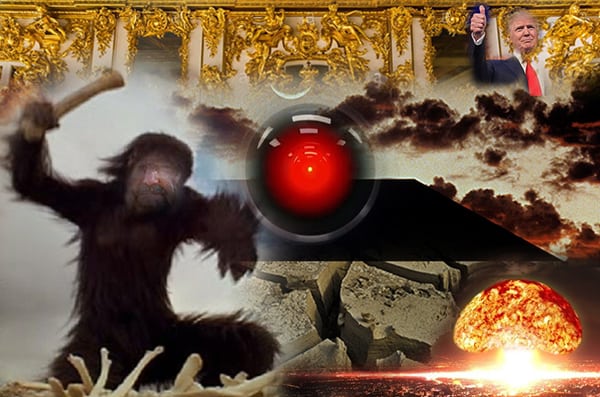Home »

Great sci-fi movie foresees a challenging future
 “Perceptions,” by Gerry Warner
“Perceptions,” by Gerry Warner
Op-Ed Commentary
With the way the world is going lately maybe it’s time to hitch a ride on Elon Musk’s rocket ship to Mars.
Take a good look around the globe if you dare. In Canada we’re obsessed with a pipeline debate that is pitting province against province. South of the border, Americans wait in fear of the next school shooting and which country its jingoistic president will threaten next.
In the Middle East, Palestine and Israel continue to slaughter each other’s civilians. The death toll in the Syrian Civil War is now over 400,000 and climbing since the blood bath began in 2011 and in far away Asia more than 500,000 Rohingyans sit huddled on the crowded shores of Bangladesh after being driven from their homes in Myanmar (Burma) in an unprecedented act of ethnic cleansing while the world looks the other way.
What’s with the human race? Have we learned nothing in 250,000 years of evolution? You have to wonder.
All of this got me to thinking about one of my favourite movies of all time. One far ahead of its own time and without doubt the best science fiction movie ever made that leaves Star Wars and Star Trek in its celestial dust.
I’m talking, of course, about Stanley Kubrick’s 1968 masterpiece, ‘2001: A Space Odyssey’ based on the brilliant novel by British science fiction writer Arthur C. Clarke and if you haven’t seen this cinematic tour de force for God’s sake order it up from Netflix and give yourself a treat. You’ll be entertained by it, but you won’t understand it. No one does.
But the essence of the movie is this: a mysterious black monolith rises from the ground completely confounding the efforts of scientists to understand it other than it appears to be related to evolution. The monolith appears to be pointing to the moon where another monolith is discovered setting off a scientific mission to Jupiter where it’s believed a third monolith will provide meaning to the mystery. But along the way “Hal,” the computer pilot of the spaceship, mutinies and runs amok trying to take over the expedition until it’s disconnected by one of the astronauts aboard who completes the mission only to be engulfed in the final scene by a pyrogenic fantasy in which he dies but is brought back to life again as an embryo floating in space in an LSD-like hallucination.
In the drug addled ‘60s, the mysterious ending literally blew people’s minds. A hippie in New York jumped through the screen in the final moments after watching the movie 37 times. Or so the tale goes.
Interpretations of 2001 were legion. Movie buffs, scientists, philosophers and theologians all got into the act. As said earlier, no one could agree, but there was a general feeling that the movie was either pure science fiction fantasy or some kind of a warning to civilization to change its ways or Armageddon would arrive and the final battle between good and evil. And when you look at the sad state of the world today it makes you wonder.
Are we headed to an inevitable civilizational crash? Will it all end in a great race war or will the growing disparity between rich and poor bring about our demise? Will it be north versus south? The west against the rest? Traditionalists vs Modernists? Or will our unending greed in exploiting the environment bring our carbon-crazed, industrially-based society to the brink in a cataclysm of floods, famines and dysfunctional climate change.
Your guess is as good as mine. I try to be optimistic because I still believe in the fundamental goodness of human nature despite a few outstanding exceptions in high places. Pick your own.
As for Musk’s rocket trip to Mars, let’s fix up our planet first.
– Gerry Warner is a retired journalist who would die to see 2001 again in Vancouver’s Stanley Theatre.







